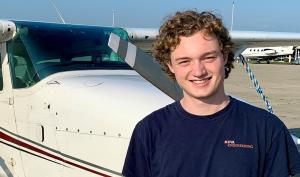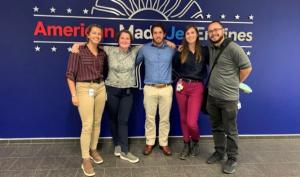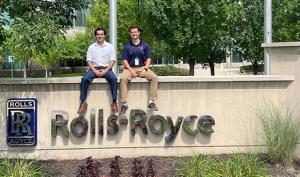Undergraduate Opportunities
A Program for Excellent Undergraduate Students
UVA Engineering and Rolls-Royce are committed to preparing the next generation of engineers focused on technologies of interest to Rolls-Royce and its partners.
The collaboration between UVA Engineering and Rolls-Royce provides strong experiential learning opportunities in Rolls-Royce-partnered facilities such as the Rapid Prototyping (3-D) Laboratory and the Mechatronics Laboratory.
Through UVA's Center for Engineering Career Development, students also participate in Rolls-Royce-involved job fairs and networking events, which lead to internships and jobs.
THIRD-YEAR STUDENTS: CLICK HERE TO LEARN ABOUT THE ROLLS-ROYCE SUMMER INTERNSHIP OPPORTUNITY.
Summer Internships Offer Eye-Opening Experiences
Michael Fogarty
Michael Fogarty helped move component improvements through the Rolls-Royce technical validation pipeline while interning at the company’s North American headquarters in Indianapolis. Fogarty is a fourth-year mechanical engineering student advised by CINDY, CHANG, associate professor of mechanical and aerospace engineering and engineering systems and environment.
Fogarty presented design proposals to several progressive review boards for vetting and approval by program leadership. Day-to-day, he worked with technical experts to think through design challenges and their solutions.
“I am very passionate about aerospace and grateful for the opportunity to contribute to a large-scale industry program,” Fogarty said. “What I found most rewarding was the opportunity to work on changes reflected in the design of engines across an entire aircraft fleet. That was an empowering realization.”
Crestienne DeChaine
Crestienne DeChaine worked in the materials science department at a Rolls-Royce engine manufacturing plant in Indianapolis. DeChaine is a fourth-year mechanical engineering student advised by LIN MA, professor of mechanical and aerospace engineering, who is double majoring in materials science and engineering. DeChaine (second from right) is joined by fellow interns Alison Pickering, Leah Alexander and Ethan Caballero and a Materials Science Department colleague.
DeChaine worked with the environmental barrier coatings that protect against corrosion of the ceramic matrix composites Rolls-Royce uses in their engine parts. She investigated how different compositions of sand – technically referred to as calcium magnesium alumino-silicate or CMAS, will attack the coatings and how to predict which composition will result in the most damage.
“For one of my projects, I was asked to “hack” a Rockwell hardness tester, using it to induce damage into the coating rather than just measuring hardness,” DeChaine said. “The procedure I developed for that project will be used in the future as a unique way to understand coating behavior.”
The internship was DeChaine’s first opportunity to work in the materials science industry and to learn about ceramics in detail. “Interning at Rolls-Royce has helped me decide that in the future, I’d like to go to graduate school and get my Ph.D. in materials science and engineering,” DeChaine said.
Conner Steenrod
Conner Steenrod, pictured above with Rolls-Royce intern Wally Gulumian, worked in the Test department of Rolls-Royce’s Indianapolis headquarters as a test operations engineer. Steenrod is a fourth-year mechanical engineering student advised by MICHAEL MOMOT; he is minoring in computer science.
Steenrod conducted experimental tests involving design and performance of the whole engine build, to assess whether new technologies performed as expected based on modeling and simulation. He also performed production tests to makes sure engines were meeting quality and efficiency standards, analyzing data and implementing solutions when necessary.
“It was an eye-opening experience,” Steenrod said. “Being part of leading-edge experimental tests allowed me to apply my engineering knowledge and theory to understand real-world applications and limitations. I utilized my technical skills to solve business issues and improve workplace efficiency in a way that goes beyond the traditional role of a mechanical engineer.”


